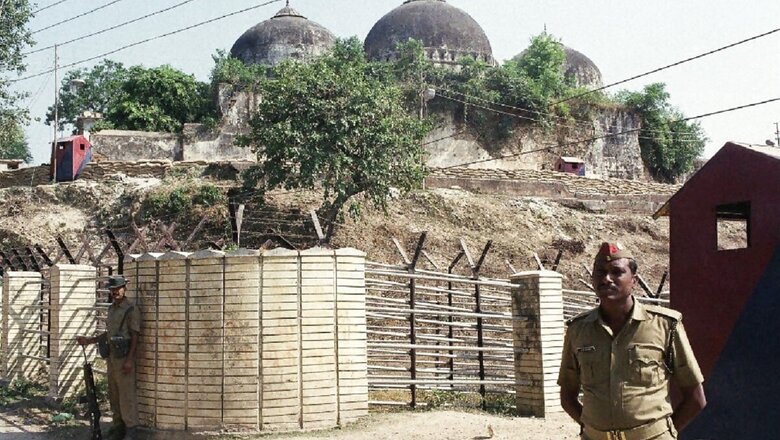
views
Exonerating all the 32 accused, including BJP leaders Lal Krishna Advani, Murli Manohar Joshi, Kalyan Singh, Uma Bharti, in the Babri Masjid demolition case, the special CBI court dismissed charges of criminal conspiracy against leaders of the Vishva Hindu Parishad (VHP) and Rashtriya Swayamsevak Sangh (RSS) noting that they were instead trying to protect themselves and the masjid from a section of the agitated kar sewaks.
All the charges, from obstructing a civil servant from discharging their duty to criminal conspiracy, were rejected by Special CBI court Judge Surendra Kumar Yadav in his 2300-page verdict.
In this explainer, News18 highlights the three main reasons why the court dismissed all the charges levelled by the CBI against the accused.
1. The violence by Kar Sewaks was spontaneous. The accused were, in fact, trying to save the structure.
The court noted that VHP leader Ashok Singhal was presiding over a symbolic ‘kar sewa’ for which five lakh kar sewaks were present at the site of dispute. Singhal, the court observed, had asked the kar sewaks to fetch a handful of soil and water from the Saryu river. Upon hearing this, a section of the kar sewaks got agitated and started pelting stones at the mosque.
“It is clear that the section that abruptly got agitated and became violent,” the court said, adding there was nothing to connect the unruly group of kar sewaks with the accused.
“Ashok Singhal even asked this section of kar sewaks to return, but they started attacking him instead. Some of them broke through the barricades and climbed on top of the structure… other leaders also tried to direct the kar sewaks out of the disputed site… Ashok Singhal and Vijaya Raje Scindia had no apprehension that a section of the Kar Sewaks would get agitated and will climb on top of the disputed structure and demolish it,” the court observed.
2. No way to connect objectionable slogans with the accused. Evidence provided by CBI was not sealed.
One of the evidence presented by the CBI was audio recording of some communal slogans calling for the demolition of the Babri Masjid on the fateful day. The court noted that “there were lakhs of kar sewaks present in the disputed site who were shouting the aforementioned slogans. As far as the question of the accused giving inciteful speeches is concerned, in this regard there is no audio recording matched with the voice sample of the accused that has been presented before the court”.
The CBI had also furnished video and audio footage of allegedly inciteful speeches made by, among others, Sadhvi Rhitambara. The court noted that the audio copy of Sadhvi Rhitambara’s speeches presented before the court were not sealed. “Evidence in form of video cassettes and taped cassettes have been presented to the court but who gave which speech has not been established. If accused gave inciteful statements then those alone cannot be the basis on which they can be held guilty,” the court observed.
3. Accused were not aware that 144 Code of Criminal Procedure (CrPC) was imposed. Local intelligence establishes that communal harmony was intact.
The court noted that “the accused did not know that the assembly in the dispute site was declared unlawful assembly”, since violence began around 12 in the afternoon, by when nearly 5 lakh kar sewaks were already present at the disputed site, and Section 144 of the CrPC prohibiting assembly of four or more people was only imposed around 4 pm.
Regarding the argument that repeated warnings had been issued by the administration against the deteriorating communal atmosphere in the area by subsequent kar sewas, the court considered a report of the Local Intelligence Unit (LIU). From this report, the court noted, “It is clear that regarding the Kar Sewa there was no sense of agitation among the Muslims, only sadness. This establishes clearly the fact that Hindu-Muslim unity was still intact in Ayodhya at that time.”
The court also did not accept the evidence, in the form of newspaper clippings in which the accused allegedly admitted to their guilt. In two cases — of Lok Sabha MP Sakshi Maharaj and UP’s then Chief Minister Kalyan Singh — interviews of such nature were furnished before the court by CBI as evidence. The court observed that just because they gave a statement in their interview, the guilt of the accused was not established. “The crime still has to be proven,” the court observed.


















Comments
0 comment